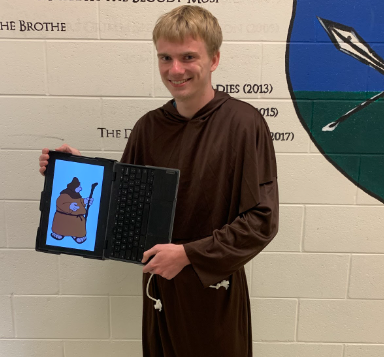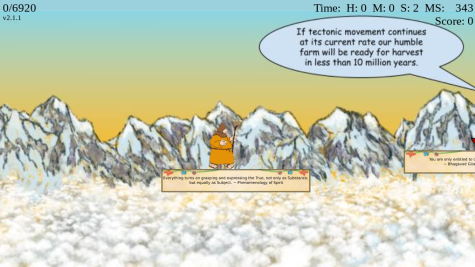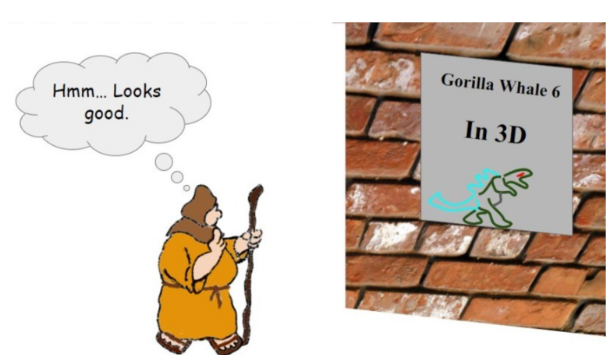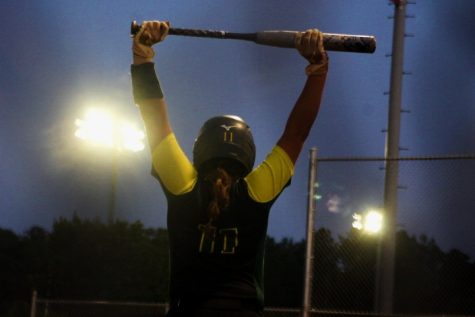Andrew Orndorff publishes his own webcomic

Orndorff holds a picture of his comic’s main character, Philobar.
Apart from his schoolwork and job performing as Clover Hill’s cav man mascot, senior Andrew Orndorff has another pursuit; he writes and publishes a webcomic called “Philobar: the Pesky Monk” on the comic-sharing platform Webtoon.
Orndorff first started publishing the comic in Aug. 2022, and has since written 19 strips and received over 400 views. The story is based on the adventures through time and space of the titular character, Philobar.
“Philobar is a monk but he’s not an ordinary monk because he’s very philosophically and scientifically minded,” Orndorff said. “He is a very comedic character, but also a tragic one. His ultimate goal is the axiomatization of mathematics. He’s living in a very barbaric time, and he wants to create a foundation of stable reason for the development, philosophically, of the human race. But his efforts always sort of backfire, and in the end he only creates more chaos.”
The comic strips follow Philobar’s journey to find the ultimate truth through the avenues of theology, science and philosophy. Orndorff was inspired by his own love for philosophy, science and math as well as “xkcd,” a webcomic created by Clover Hill graduate Randall Munroe that explores similar themes.
“I thought Philobar was an interesting character because I think philosophy is an interesting topic,” Orndorff said. “Ultimately my main inspiration was xkcd. I try to carry a lot of the same concepts scientifically. Xkcd is highly based in linguistics, science and mathematics; it has a lot of references to those things, and “Philobar” does too. But there’s also a lot of emphasis on philosophy and history.”
Orndorff decided to write and publish the comic because he has always been a fan of comics and felt a calling to make his own. He also wanted to take advantage of the growing digital comic stage.
“I’ve always read the comics in newspaper strips, and I liked them a lot,” Orndorff said. “It’s a declining profession because newspapers as a whole are going down, but there’s a big opportunity with web comics because they’re only going up.”
To reach the wide audience available to modern webcomics, he publishes “Philobar” on his own page on Webtoon, a digital comic platform that is available as both a website and an app.
“[To access the comic] you can just type in ‘Philobar: the pesky monk’ on your computer or phone [in the internet search bar] and it should come up and you can start browsing on Webtoon.”
Additionally, he has already begun to expand “Philobar” beyond the webcomic. This spring, he worked with fellow senior Isaac Lester to design a video game based on the comic strip called “Philobar’s Mystical Mountain Adventure.” To Orndorff, the game represents the next step for his story.
“The video game is very much an evolution in the plans for Philobar,” Orndorff said. “We want to expand this into a pretty large media franchise eventually. I’m going to link the game to my webcomic so you can play it that way.”

To make the game, Orndorff did all the art and writing while Lester coded the entire game from scratch, using coding languages to bring Orndorff’s vision to life. During the coding process, he received help from another senior and coder, Matthew Mccullen, on the more complex parts.
“The idea is it’s all in JavaScript,” Lester said. “I had to code the entire physics engine from scratch because I didn’t want to use any plugins. So all of it is in JavaScript and HTML, and the whole process is making the classes, making the move engine and then just getting the game out.”
The game’s plot is based around events and characters in the comics that are modified to fit a video game. The player controls Philobar with the goal of crossing the map by jumping from platform to platform while avoiding an enemy from the comic strip.
“It takes a lot of inspiration from the comics,” Lester said. “The idea behind it is that there are these Higgs-Bozo particles, which are little clowns that are included in the comics, and they are the enemies. The whole idea behind it is that you have to defeat the enemies while getting to the end in the fastest time possible. To defeat them, you jump on top of them.”
Orndorff and Lester have shared the game with other students and made a leaderboard to track top scores. In Lester’s eyes, the game has become quite popular at Clover Hill in the weeks since the two released it.
“People are competing for scores,” Lester said. “I actually talked to one of my teachers, and they were jokingly upset because they were like ‘[students] were not doing my review because they were playing your game.’ A lot of kids have been competing for the top score. Our leaderboard is very competitive right now. And it is very impressive because the scores that are coming out are basically the fastest possible times, like using the physics alone, not even just skill.”
Orndorff and Lester will continue working on the game after graduation to create several new levels, and Orndorff plans on writing the comic for years to come. His goal is to provide readers with an entertaining and educational experience that will stick with them and give them insight into new topics.
“If I can compel some people to become more interested in philosophy, science and linguistics, then I think that would be a good thing,” Orndorff said. “If you’re interested in learning new things, then just check it out. It’s completely free and it only takes a few seconds to just type it in and then start looking … I plan on continuing to write the webcomic for a long, long time.”

Ben is a senior in his third year of writing for the Cavalier Chronicle and his second as an editor. His love for writing led him to join the staff, and...














Aksel • May 11, 2023 at 2:20 pm
andrew is the coolest cav
Aksel • May 11, 2023 at 2:20 pm
andrew is the coolest cav
Andrew Orndorff • May 12, 2023 at 1:19 pm
Thank you!